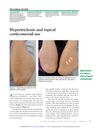 15 citations,
June 2020 in “Experimental Dermatology”
15 citations,
June 2020 in “Experimental Dermatology” Hormones and genes affect hair growth and male baldness.
 19 citations,
January 2012 in “Dermato-endocrinology”
19 citations,
January 2012 in “Dermato-endocrinology” Moderately high prolactin levels do not cause hair loss in women.
 January 2014 in “Side effects of drugs annual”
January 2014 in “Side effects of drugs annual” Exposure to certain sex hormones can increase health risks, while some hormone therapies may offer benefits for specific conditions.
 27 citations,
May 2002 in “The Journal of Clinical Endocrinology & Metabolism”
27 citations,
May 2002 in “The Journal of Clinical Endocrinology & Metabolism” Brothers of women with PCOS tend to have higher levels of a hormone called DHEAS, indicating a possible genetic link.
 258 citations,
July 2016 in “Reproductive Biology and Endocrinology”
258 citations,
July 2016 in “Reproductive Biology and Endocrinology” The document concludes that insulin resistance is key in PCOS development and early treatment is crucial to prevent complications.
 7 citations,
January 2017 in “American Journal of Biological Anthropology”
7 citations,
January 2017 in “American Journal of Biological Anthropology” Sardinians were historically short due to a mix of genetics and factors like disease and poor nutrition, but recent height increases suggest better living conditions had a bigger impact.
 20 citations,
January 2016 in “Open Journal of Endocrine and Metabolic Diseases”
20 citations,
January 2016 in “Open Journal of Endocrine and Metabolic Diseases” PCOS affects fertility and is linked to obesity and menstrual irregularities; lifestyle changes are recommended for treatment.
 February 2022 in “Cleveland Clinic Journal of Medicine”
February 2022 in “Cleveland Clinic Journal of Medicine” Prolonged use of topical corticosteroids can cause excessive hair growth.
 23 citations,
January 2016 in “Transgender health”
23 citations,
January 2016 in “Transgender health” Hormone therapy with estradiol and spironolactone can regrow scalp hair in transgender women by lowering testosterone to female levels.
 December 2015 in “Kosin Medical Journal”
December 2015 in “Kosin Medical Journal” PCOS treatment should address both symptoms and metabolic risks, starting with lifestyle changes and possibly including medication.
 73 citations,
February 2007 in “The American Journal of Medicine”
73 citations,
February 2007 in “The American Journal of Medicine” PCOS is a common hormonal disorder in women, treated with lifestyle changes and medications like hormonal contraceptives and metformin.
 35 citations,
February 1994 in “Fundamental and applied toxicology”
35 citations,
February 1994 in “Fundamental and applied toxicology” High doses of finasteride cause cell growth and tumors in mice.
 3 citations,
January 1994 in “Toxicological Sciences”
3 citations,
January 1994 in “Toxicological Sciences” Finasteride causes abnormal growth in male mice cells at high doses.
 September 2023 in “F&S reports”
September 2023 in “F&S reports” PCOS may increase the risk of mental health issues like depression and anxiety.
 9 citations,
June 2020 in “BMC Molecular and Cell Biology”
9 citations,
June 2020 in “BMC Molecular and Cell Biology” Stress hormone CRF can cause hair loss by affecting hair growth cells and hormones.
 May 2023 in “Animal Reproduction Update”
May 2023 in “Animal Reproduction Update” High levels of cortisol in hair show long-term stress which can lower fertility in animals.
 May 2020 in “Research Square (Research Square)”
May 2020 in “Research Square (Research Square)” Stress hormone CRF causes hair loss and inhibits hair growth in human cells.
 January 2020 in “Research Square (Research Square)”
January 2020 in “Research Square (Research Square)” Stress hormone CRF causes hair loss and stops hair cell growth.
 9 citations,
March 2021 in “Hormones”
9 citations,
March 2021 in “Hormones” COVID-19 may affect male fertility and women might have better outcomes due to hormonal and immune differences.
 30 citations,
August 1992 in “The Journal of Clinical Endocrinology and Metabolism”
30 citations,
August 1992 in “The Journal of Clinical Endocrinology and Metabolism” Finasteride doesn't affect hormone levels in normal men.
16 citations,
July 2020 in “Psychoneuroendocrinology” People with Parkinson's disease have higher levels of cortisone in their hair, which may indicate chronic stress hormone dysfunction.
3 citations,
January 2011 in “International journal of trichology” Low DHEA-S levels might be linked to alopecia areata and could be a potential treatment target.
 67 citations,
July 2016 in “Reviews in Endocrine and Metabolic Disorders”
67 citations,
July 2016 in “Reviews in Endocrine and Metabolic Disorders” Stress can worsen skin conditions by affecting hormone levels and immune response.
 November 2023 in “International journal of reproduction, contraception, obstetrics and gynecology”
November 2023 in “International journal of reproduction, contraception, obstetrics and gynecology” Polycystic ovary syndrome causes high male hormone levels, leading to symptoms like excess hair, acne, and fertility problems.
3 citations,
January 2017 in “Journal of clinical and diagnostic research” Injecting steroids like Triamcinolone Acetonide for skin treatments can cause Cushing's Syndrome.
 56 citations,
November 2010 in “Pigment Cell & Melanoma Research”
56 citations,
November 2010 in “Pigment Cell & Melanoma Research” Brain hormones significantly affect hair color and could potentially be used to prevent or reverse grey hair.
11 citations,
October 2020 in “General and comparative endocrinology” Male C57BL/6 mice show age-related fluctuations in certain hormones and their ratios in both blood and hair.
7 citations,
March 2022 in “Journal of the American Academy of Dermatology” Stress can trigger or worsen alopecia areata.
 4 citations,
August 2021 in “Theriogenology”
4 citations,
August 2021 in “Theriogenology” Neurosteroids play a key role in controlling the brain-adrenal gland activity in pregnant sheep, both in normal and stressful situations.
 2 citations,
February 2021 in “Brain Research”
2 citations,
February 2021 in “Brain Research” Testosterone affects blood pressure control and inflammation in male rats with endotoxic shock, and blocking certain hormones may help treat it.

























